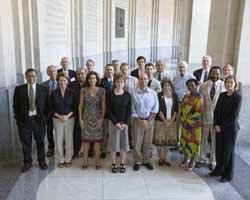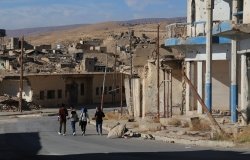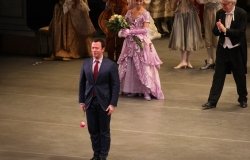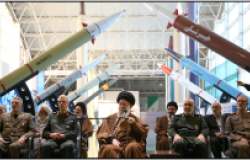The Woodrow Wilson Center Announces 2011-2012 Fellowship Class
Meet the new class of fellows who will arrive in September to spend an academic year at the Wilson Center.

WASHINGTON—Jane Harman, director, president & CEO of the Woodrow Wilson International Center for Scholars, announced the members of the 2011-2012 fellowship class. The 23 fellows, most of whom are expected to start September 2011 to spend an academic year in residence at the Center, include scholars and practitioners from the United States, Argentina, China, India, Italy, Turkey, the United Kingdom, and Venezuela.
“The Wilson Center brings together thinkers and doers – policymakers, scholars and business leaders – in a safe political space for informed, open, and civil discussion about the tough issues we face,” said Harman. “Wilson Center scholars are the backbone of the institution – and their diversity adds immensely to the richness of thought and dialogue. We are proud to have such a distinguished group of women and men joining us this fall.”
The 2011-2012 fellows are listed below along with the projects they will pursue while in residence at the Wilson Center.
- Eric Arnesen, Professor of History, The George Washington University. “A. Philip Randolph: Civil Rights, Labor, and the New Black Politics.”
- Robert Baum, Associate Professor and Chair, Department of Religious Studies, University of Missouri. “From Many Paths: A History of African Religions.”
- James Brennan, Professor of History, University of California, Riverside. “Days of Destruction: Political Violence and its Legacies in Argentina’s ‘Dirty War.’”
- Roberto Briceño-León, Director, Laboratory for Social Sciences (LACSO), Research School of Social Sciences, Caracas, Venezuela. “Citizen Insecurity: Poverty or Institutionality? The Deterioration of Venezuela in the Light of the Improvement in Colombia and Brazil.”
- David Ciepley, Assistant Professor, Department of Political Science, University of Denver. “Beyond Public and Private: The Corporation as Governance Institution.”
- Julia Clancy-Smith, Professor of History, University of Arizona. “From Household to School Room to Post-Colonial State: Educating and Schooling in North Africa, 1840-1970.”
- Kenton Clymer, Distinguished Research Professor of History, Northern Illinois University. “The United States and Burma: A History.”
- Rochelle Davis, Assistant Professor of Anthropology, Center for Contemporary Arab Studies, Edmund A. Walsh School of Foreign Service, Georgetown University. “Cultural Knowledge and U.S. Military Strategy.”
- Mikulas Fabry, Assistant Professor of International Affairs, Sam Nunn School of International Affairs, Georgia Institute of Technology. “The Idea and Historical Practice of Territorial Integrity in International Relations.”
- Laura Gomez-Mera, Assistant Professor of International Studies, University of Miami. “The Politics of International Cooperation in the Fight Against Human Trafficking.”
- Jacqueline Hagan, Professor of Sociology, University of North Carolina at Chapel Hill. “Skills on the Move: Re-Examining the Relationship between Human Capital and Social Mobility in Reference to Migration between Mexico and the United States.”
- Maurice Jackson, Associate Professor of History, Georgetown University. “African Americans in Washington, D.C.: Biography of a People.”
- Polly Jones, Lecturer in Russian Culture, School of Slavonic and East European Studies, University College London, United Kingdom. “Burying Stalin: The Soviet Union between Past and Future, 1953-91.”
- Joanna Lewis, Assistant Professor of Science, Technology, and International Affairs, Edmund A. Walsh School of Foreign Service, Georgetown University. “Towards a Model for Transnational Eco-Innovation: Assessing Cross-Border Clean Energy Initiatives with China.”
- Irfan Nooruddin, Associate Professor of Political Science, The Ohio State University. “War by Other Means: The Politics of Post-Conflict Reconstruction.”
- Luis Pásara, Researcher and Professor, Instituto de Iberoamérica, Universidad de Salamanca, Spain. “Justice and Justice Reform in Latin America.”
- Karthick Ramakrishnan, Associate Professor of Political Science, University of California, Riverside. “For Party and Nation: The Politicization of U.S. Immigration at the State and Local Level.”
- Xuefei Ren, Assistant Professor of Sociology and Global Urban Studies, Michigan State University. “The Changing Urban Governance in China and India, 1980-2010.”
- Fabio Rugge, Professor and Dean, Political Science Faculty, Pavia University, Italy. “Food Governance in the 20th Century: A Comparative Study.”
- Marc Sommers, Associate Research Professor of Humanitarian Studies, The Fletcher School, Tufts University. “Youth and Conflict in Africa: Towards a New Policy Approach.”
- Kathleen Vogel, Assistant Professor, Science and Technology Department and the Judith V. Reppy Institute for Peace and Conflict Studies, Cornell University. “Expertise, Secrecy, and Intelligence Assessments.”
- Yafeng Xia, Associate Professor of History, Long Island University. “Between Ideology and National Interests: A History of China’s Relationship with North Korea, 1949-1992.”
- Ahmet Yukleyen, Croft Assistant Professor of Anthropology, University of Mississippi. “Salafism and Radicalization of Muslim Youth in Europe.”
Media with questions should contact Dana Steinberg at (202) 691-4038 or by e-mail to dana.steinberg@wilsoncenter.org.
The Woodrow Wilson International Center for Scholars is the national, living memorial honoring President Woodrow Wilson. In providing an essential link between the worlds of ideas and public policy, the Center addresses current and emerging challenges confronting the United States and the world. The Center promotes policy-relevant research and dialogue to increase understanding and enhance the capabilities and knowledge of leaders, citizens, and institutions worldwide. Created by an Act of Congress in 1968, the Center is a nonpartisan institution headquartered in Washington, D.C., and supported by both public and private funds.









